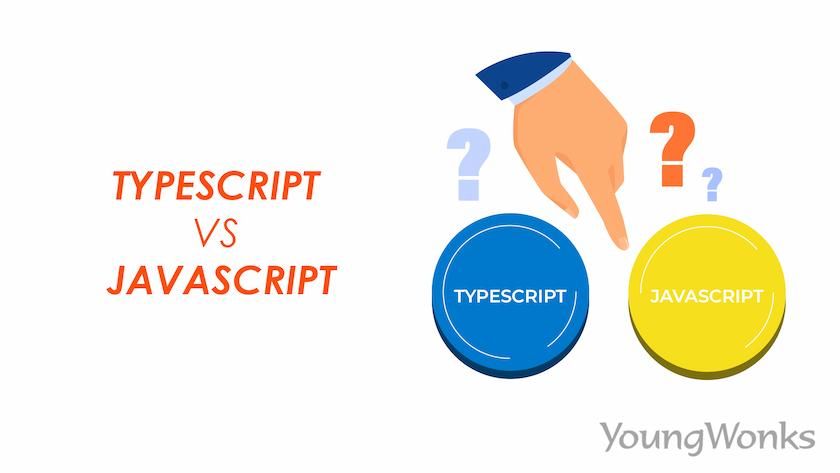Jun 24, 2023 By Team YoungWonks *
What is TypeScript?
TypeScript is an open-source, object-oriented and strongly typed programming language which is a superset of JavaScript. A typescript code is converted into JavaScript which can be executed in any JavaScript supported environment (like Node.js or any browser which supports ECMAScript 3 or newer versions). So, if you save your JavaScript programming file (.js) with a TypeScript (.ts) extension, it will execute perfectly fine. But that doesn’t mean that both languages - TypeScript and JavaScript are the same. TypeScript was designed by Anders Hejlsberg at Microsoft. The limitations of JavaScript in building large scale applications at Microsoft and among its external customers lead to the creation of TypeScript.
TypeScript is an enhanced version of JavaScript with some additional features which is used to support strong interaction with the editor. It is a scripting language that understands JavaScript and uses type and interfaces to provide powerful capabilities without any need for additional code. Since TypeScript is compiled to plain JavaScript, it is suitable for both the frontend and backend of app development. TypeScript compiler can compile the .ts files into ES3, ES4, and ES5 also. JavaScript is a preferred programming language for the frontend of web pages and apps. As a result, TypeScript may be used for the same reason, but it also works well on the server-side for complicated and large-scale enterprise projects.
What are the features of TypeScript?
Here are some TypeScript features:
- Easy to maintain and boosts project productivity
- Feasible to use static typing and annotations
- Supports object-oriented features such as interfaces, inheritance, and classes
- Simple debugging, and problems are detected at an early stage
- Supports ES6 (ECMAScript), which provides a simpler syntax for handling objects and inheritance.
- Full-featured IDE support
- Namespaces
- Interfaces
- Null checking
- Generics
- Access modifiers
What is JavaScript?
It is a powerful client-side scripting language which is mainly used to enhance the interaction of the user with the webpage. It is also being used widely in web development, software development, game development and Mobile application development. We can use JavaScript for both frontend frameworks like TezJS, React, and backend with Node.Js and Deno frameworks. Many developers also use JavaScript with CSS and HTML to create web applications. It was written by Brendon Eich in 1995 while he was working with NetScape and was implementing Java, the hot buzzword for the browser. JavaScript was initially called Mocha, which was later renamed to Light Script and then to JavaScript. JavaScript was brought to the ECMA standard group in 1996 to create an official standard of the language that everyone could follow. This led to ES1, ES2, ES3 and ES5 in 2009.
It is an object-based scripting language which supports polymorphism, encapsulation and to some extent inheritance as well. It does not require a compiler. It runs in a web browser and so we can run it in Google Chrome, Safari, etc and in any other platform which has a JavaScript engine.
What are the features of JavaScript?
Here are some unique features that JavaScript offers:
- Flexible, dynamic, and cross-platform
- Can be used for both client-side and server-side
- Lightweight interpreted
- Supported by all web browsers
- Weakly typed
- JIT compilation
What are the advantages of TypeScript over JavaScript?
The following are some of the advantages of TypeScript over JavaScript:
Compilation
JavaScript is an interpreted language and hence there is no need to compile it. As a result, it must be run to check if it is genuine. If there is an error, it implies that we should write the entire code to find out the output. We rely on integrated development environments (IDEs) to help with tasks such as adding, modifying, and testing new code, but IDEs cannot do the validation of pure JavaScript references. This might result in spending hours in finding the faults in the code. This is when we can use TypeScript which provides type checking to reduce errors during compile time. If TypeScript detects any syntax errors, it will compile the code and generate compilation errors. This aids to the detection of errors prior to the execution of the script.
Object-oriented programming support
TypeScript supports object-oriented programming and also supports type definitions. Existing JavaScript libraries are defined in TypeScript definition files. As a result, these js libraries can be included in TypeScript code. It also supports API Documentation.
Static vs dynamic typing
TypeScript has strong static typing. JavaScript doesn’t have a powerful static typing system. The TLS (TypeScript Language Service) transcript comes with an optional static typing and type inference system. The TLS can deduce the type of variable defined without any type based on its value. It is a static typed language whereas JavaScript uses dynamic typing just like Python. TypeScript has a powerful type system, including generics and JS features.
Optional parameter system
TypeScript provides an optional type system for JavaScript code. When a client does not have a value for a parameter, they can pass a null. Optional arguments are another feature of TypeScript. It is not necessary for the client to supply a value for the optional parameters.
Community
The developers community of JavaScript is not as large as that of TypeScript even though JavaScript offers many libraries, frameworks, and code practices. TypeScript had gained popularity at a very short span of time and was implemented by various enterprises and programmers. Thus, there is a huge TypeScript developer’s community and as a result, the tutorials and guidelines to learn TypeScript are in abundance for the beginners.
TypeScript vs JavaScript
The key differences between TypeScript and JavaScript are noted below:
- TypeScript is object-oriented programming language whereas JavaScript is a scripting Language and prototyping features are present in this language.
- TypeScript allows static typing whereas JavaScript doesn’t.
- Errors can be found and corrected in TypeScript during compile time and in JavaScript, errors can be only found in runtime as it is an interpreted language.
- There is support for ES3, ES4, ES5 and ES6 in TypeScript. However, in JavaScript, there is no support for compiling additional ES3, ES4, ES5 or ES6 features.
- In TypeScript, functions can have optional parameters feature which is not possible in JavaScript.
- TypeScript is converted to JavaScript code to be understandable for browsers whereas JavaScript can be directly used in browsers.
- In TypeScript, proper build setup (npm package) is required for Static type definitions. In JavaScript, no build setup is required.
Which one is better, TypeScript or JavaScript?
This totally depends on the experience of the programmers. If they are working on projects and applications which consists of relatively lesser lines of code, it is more advisable to go with JavaScript. But if they have knowledge and a expertise development team then for applications or large projects which has complex and larger number of code lines in their codebase, TypeScript is most recommended.
Ever since JavaScript was developed in 1995 , developers are using it and implementing new features, it’s in better demand and companies like Instagram, Airbnb, Codecademy and many more uses JavaScript. Whereas, TypeScript was launched in 2012 is a object oriented language so we can use most of the advanced features like modules, interface, generic other features like static typing and a lot more which are not supported in JavaScript. This is a reason why Frameworks like Angular 2 also uses TypeScript. Therefore since JavaScript is an old language , majority of the industry has used it and are still using it widely. But Transcript has been here for just a decade now and because of it’s advanced features, its giving a very tough competition to the other scripting languages in the market. Moreover, TypeScript can be used to develop a JavaScript application for both client-side and server-side. Thus, we can definitely conclude that the demand for TypeScript will definitely be more in the future compared to JavaScript.
Expanding Your Child's Coding Skills
After understanding the differences between TypeScript and JavaScript, you might be wondering about the next steps in nurturing your child's coding abilities. Coding Classes for Kids at YoungWonks offer a comprehensive environment where young learners can start their coding journey with a strong foundation. For those inclined towards learning one of the most versatile and popular programming languages, our Python Coding Classes for Kids are designed to cater to both beginners and advanced learners. Meanwhile, children interested in building complete web applications will find our Full Stack Web Development Classes to be highly beneficial, covering everything from frontend to backend development.
*Contributors: Written by Pronamee Hazarika; Edited by Rohit Budania; Lead image by Shivendra Singh

